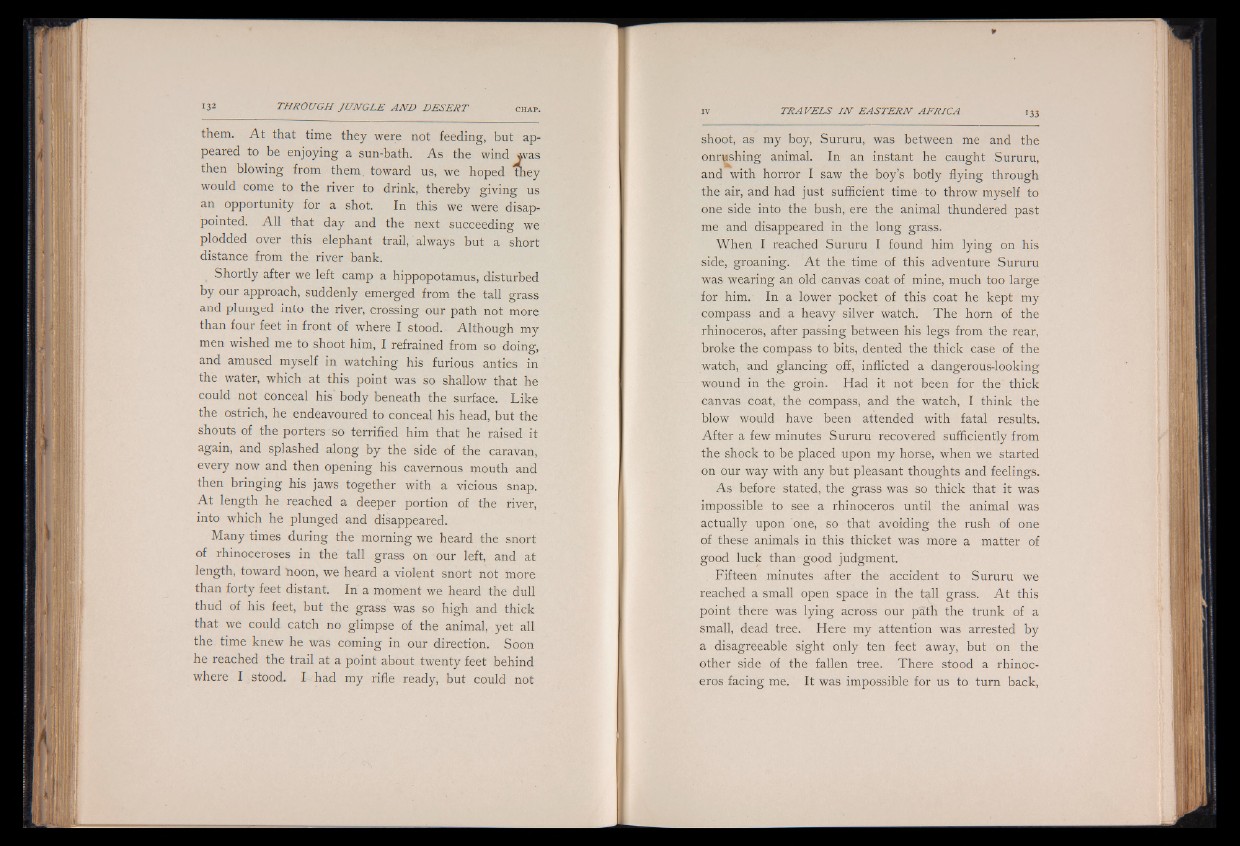
them. A t that time they were not feeding, but appeared
to be enjoying a sun-bath. As the wind was
then blowing from them, toward us, we hoped they
would come to the river to drink, thereby giving us
an opportunity for a shot. In this we were disappointed.
All that day and the next succeeding we
plodded over this elephant trail, always but a short
distance from the river bank.
Shortly after we left camp a hippopotamus, disturbed
by our approach, suddenly emerged from the tall grass
and plunged into the river, crossing our path not more
than four feet in front of where I stood. Although my
men wished me to shoot him, I refrained from so doing,
and amused myself in watching his furious antics in
the water, which at this point was so shallow that he
could not conceal his' body beneath the surface. Like
the ostrich, he endeavoured to conceal his head, but the
shouts of the porters so terrified him that he raised it
again, and splashed along by the side of the caravan,
every now and then opening his cavernous mouth and
then bringing his jaws together with a vicious snap.
A t length he reached a deeper portion of the river,
into which he plunged and disappeared.
Many times during the morning we heard the snort
of rhinoceroses in the tall grass on our left, and at
length, toward ‘noon, we heard a violent snort not more
than forty feet distant. In a moment we heard the dull
thud of his feet, but the grass was so high and thick
that we could catch no glimpse of the animal, yet all
the time knew he was coming in our direction. Soon
he reached the trail at a point about twenty feet behind
where I stood. I had my rifle ready, but could not
shoot, as my boy, Sururu, was between me and the
onrwshing animal. In an instant he caught Sururu,
and with horror I saw the boy’s body flying through
the air, and had just sufficient time to throw myself to
one side into the bush, ere the animal thundered past
me and disappeared in the long grass.
When I reached Sururu I found him lying on his
side, groaning. A t the time of this adventure Sururu
was wearing an old canvas coat of mine, much too large
for him. In a lower pocket of this coat he kept my
compass and a heavy silver watch. The horn of the
rhinoceros, after passing between his legs from the rear,
broke the compass to bits, dented the thick case of the
watch, and glancing off, inflicted a dangerous-looking
wound in the groin. Had it not been for the thick
canvas coat, the compass, and the watch, I think the
blow would have been attended with fatal results.
After a few minutes Sururu recovered sufficiently from
the shock to be placed upon my horse, when we started
on our way with any but pleasant thoughts and feelings.
As before stated, the grass was so thick that it was
impossible to see a rhinoceros, until the animal was
actually upon one, so that avoiding the rush of one
of these animals in this thicket was more a matter of
good luck than good judgment.
Fifteen minutes after the accident to Sururu we
reached a small open space in the tall grass. A t this
point there was lying across our path the trunk of a
small, dead tree. Here my attention was arrested by
a disagreeable sight only ten feet away, but on the
other side of the fallen tree. There stood a rhinoceros
facing me. It was impossible for us to turn back,